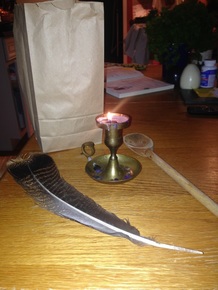
My children, of course, are older now than they were the last time I wrote about this ritual. I no longer follow them around the house as they search. I am less concerned that they will burn the house down with the lit candle.
They also are more able – perhaps, even willing – to think about the spiritual aspects of searching for chameitz. This is not just a game to get children involved in the preparations for Passover. It is an opportunity to search ourselves for the puffy arrogance that chameitz represents.
Searching for those ten pieces of bread is a ritual that we perform on the outside in order to have a meaningful moment of recognition on the inside. We all carry our egos around with us wherever we go. One of the central ideas of Passover is that the voice of Pharaoh lives within ourselves – the childish voice that cries, “I want!” and “Give me!” Real freedom requires us to let go of that voice a little bit. We unburden ourselves of our self-imposed bondage when we release ourselves from ego and embrace a soft humility that is willing to relent, to forgive, to recognize the true riches we already have, and to be at peace.
My children tonight walked through the house silently, looking for the planted pieces of bread, guided by the light of the candle, sweeping up the crumbs with the feather into the bag. They know the outer form of this ritual well by now. But, tonight, I think I saw them focussing on the inner experience, too.
After they found the last piece of bread, we all sat around the kitchen table with just that little flame to light our faces. We quietly talked about choosing one habit, one piece of arrogance or selfishness within us that we think we can learn to do without. We talked about using Passover as a time to let go. We each decided on one thing about ourselves that we think we could improve over the course of the next week.
The Haggadah that we will read tomorrow night says that “In each generation, we are obliged to see ourselves as if we personally had come out of bondage in Egypt.” It’s a lovely thought, but can it ever literally be true? I think it can. If we think of “Egypt,” not as a place, but as a state of mind, we can each experience the exodus personally and profoundly each year.
With each piece of chameitz that we place in the bag, we free ourselves from bondage. With each crumb that we sweep up with the feather, we are letting go of the chains and renewing ourselves. We each leave Egypt behind when we discover the joy of being the person that we want to be.
Other Posts on This Topic:
Bedikat Chameitz
Matzah and Chameitz

 RSS Feed
RSS Feed
